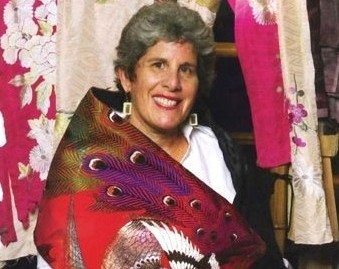By Erika Engle
The Honolulu Star-Advertiser.
Gifts between friends often become the stuff of obsession, but don’t always pave the way for a small business.
Honolulu attorney Elizabeth Kent received an elegant jacket made by friend and fellow attorney Ellen Godbey Carson some years ago.
Both enjoyed sewing and quilting, and Carson had used fabric from a Japanese haori-style jacket to make Kent’s gift.
While wearing the jacket on a trip to Seattle soon after receiving it, Kent was stopped by a half-dozen women asking to know where she got it.
Upon returning to Honolulu she excitedly suggested that Carson create a business as an outlet for her talent. Carson suggested Kent do it instead.
“OK!” she said, recalling the conversation with laughter. “I can do that.”
Vested Interest was established, the name being a nod to both her career as an attorney and the vests (and other clothing and accessory items) she would make using re-purposed kimono and obi fabric, as well as other fabrics.
“I’m a child of the ’70s,” said Kent, explaining her bent toward the whole reduce, reuse, recycle mindset that many people think only started in the current century.
“I feel like there are enough resources,” that we can take objects that are no longer being used “and give them a new life.”
Raised by wood-turning father Ron and painter-mother Myra, she got a double dose of artistic DNA.
At Kalani High School she was inspired by classmate Kathy Ching’s crocheting and hand-sewn clothing, as well as items made by Kathy’s sister Wendy, she said.
Kent was invited to the annual sale staged by arts supporter Trudy Wong “seven or eight years ago,” and her wearable wares were well received.
She connected with Ann Asakura, executive director of Temari Center for Asian & Pacific Arts, who Kent describes as “one of those pillars of the community.”
She recalls saying to Asakura, “Maybe you can tell that I’m not Japanese.”
She was warmly welcomed and offered help, contacts and information about their common passion for Japanese fabrics and related cultural practices because “it comes out of a love for the same thing,” she said.
She learned a salt-activated dyeing technique from quilter Lincoln Okita that creates unusual designs and color gradations in the fabric of some of her pieces.
Kent and her husband and “chief deconstructor” Kent Davis were vendors at the recent Temari Boro Festival.
It was a celebration of the ancient Japanese tradition of patching and re-purposing clothing, blankets and other items made of fabric until they could be used no more. After that point they were used further anyway. They were torn into strips and woven into yet another type of fabric, called “sakiori.”
Kent’s designs are generations away from “sakiori” use, however.
“One of the best parts of this are the stories” that are connected to each piece of fabric she uses, but also the memories people make for themselves while wearing one of Kent’s works. “I feel so grateful,” she said.
She has traveled to Japan to acquire kimonos and obis with friends including attorney Carson and District Judge Faye Koyanagi. With the latter, they bought so much they worried about luggage exceeding weight limits on the return flight, Kent said with a laugh.
She turns fabrics from such purchases into items to be worn or displayed around the home.
Scarves range from $35 to $80. Table runners cost about $95 depending on the fabric and the size, and jackets, whether kimono-inspired or a more modern, reversible “slouch” style, have wide-ranging prices.
Prices start from $100 for “seconds” in which the fabrics have age-related imperfections, and go up to more formal jackets of flawless fabric for up to $300, such as one recently sold at Magnolia.
On Wednesday the store had several one-of-a-kind jackets in different styles at $150.
The scarves are a popular accessory, and the jackets will completely dress up an otherwise casual outfit, said store manager Ciera Obando.
Store owner Maggie Parks has invited Kent and jewelry-making artisan and former Honolulu Advertiser reporter Beverly Creamer to a special meet-the-artist event at the store in early October, Obando said.
After 20 years with the state Judiciary, Kent left at the end of November and divides her time between creating new life for old fabrics, and helping nonprofit and government organizations with mediation and other services.
She offers custom work, with samples perusable on her website. At retail, pieces can be found at four Oahu stores, a number she doesn’t anticipate increasing.
“Life is all about balance,” said Kent.














































































































































































































































































































































































